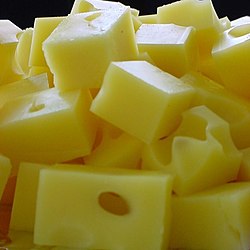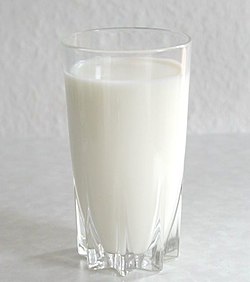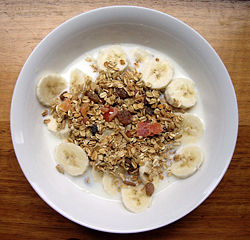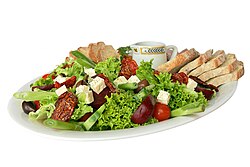Healthy eating habits/Important nutrients in the vegetarian diet

Benefits of a vegetarian diet
[edit | edit source]There are many people who follow or have followed a vegetarian diet. Historically, vegetarian diets were mostly associated with a religious or ethical belief; today more people adopt the diet due to concerns about the environment or the rights of animals. According to the last nutrition survey conducted in Australia in 1995, around 4% of the population followed a purely vegetarian diet, however many more regularly eat vegetarian meals.[1]
Well-planned vegetarian diets are associated with a lower risk of heart disease, lower blood pressure, lower blood lipid levels, and lower risk of Type 2 diabetes. [1] This is because a vegetarian diet typically includes more fibre, vitamin C, vitamin E, phytochemicals, and folate [2]. However, vegetarians should make sure that their diet contains a wide variety of animal products (such as milk and eggs) and plant foods, because there are many essential nutrients that they may miss out on.
Important Nutrients to keep in mind
[edit | edit source]Calcium
[edit | edit source]
Calcium plays an important roles in bone health, in particular, maintaining the strength and structure of bones. Consuming the right amounts may reduce the risk of osteoporosis. [3] Calcium has many important roles in the body, and close to 99% of it is stored in our bones[3]. The best food sources are dairy (milk, cheese, and yoghurt), fortified soy milk, dried apricots, spinach, and broccoli. It is recommended that adults aged 19 to 50 years consume 1,000mg of calcium per day.[4]
| Calcium sources |
|---|
| Cow's Milk/fortified milk |
| Yoghurt |
| Broccoli |
Iron
[edit | edit source]
Iron is crucial for storing and transporting oxygen around the body, and is important for energy levels and the immune system. Iron deficiency is very common, especially in women who menstruate, as they generally lose about 15mg of iron every month! [4] Symptoms of low iron intake include: fatigue, bruising easily, paleness, frequent headaches, and shortness of breath. [3] The recommended intakes for young adults are 8mg for men and 18 mg for women.[4] Red meat,eggs and fish/seafood are the best iron sources, because these contain the "haem" type of iron[3]. In contrast, plant sources of iron, such as quinoa and spinach are in the "non-haem" form. "Haem" iron is absorbed better by the body, however vegetarians can boost their absorption of "non-haem" iron by eating foods rich in vitamin C (for example, adding tomato to a bean and vegetable soup). Other chemicals that interfere with iron absorption are: tannins in tea/coffee, zinc in food, phytates found in plants, and calcium.
For vegetarians, dairy is a poor source, hence their main sources of iron are eggs and plant foods, including spinach, tofu, fortified cereals, and beans.

| TOP vegetarian sources of iron |
|---|
| tofu |
| Beans/lentils |
| Quinoa |
| Dried Apricots |
Vitamin B12
[edit | edit source]
This member of the B-vitamins group is very important for vegans and vegetarians because the only good sources are animal products[3]. B12 can only be produced by certain microorganisms, such as bacteria, which live in the gut of animals. For vegetarians, eggs and dairy are the best sources; additionally, there are many vegetarian products that are fortified with B12 such as vegetarian bacon and tofu. For vegans or those who consume very little dairy, a B12 supplement should be considered.
B12 is involved in the synthesis of DNA, activation of genes, red blood cell production, and maintaining the myelin sheath on nerves (which insulates and protects them).[3] Low intake for a long period of time can lead to irreversible nerve damage, memory loss, or depression. The current recommended intake for adults is 2.4 µg/day.[4]
| TOP vegetarian sources of B12 |
|---|
| Eggs |
| Dairy |
| Fortified vegetarian products |
Zinc
[edit | edit source]

Finally, zinc is similar to iron in that it is absorbed better from animal products, however there are many more vegetarian sources of this vital mineral[3]. Zinc has roles in immunity, smell, taste, appetite, growth, skin health, and vision, so low intake can lead to an array of symptoms. For men, zinc is important for sperm health, so their recommended intake is 14mg/day, while for women it is 8mg/day[4].
There are a variety of foods that contain high amounts of zinc, including dairy, eggs, mushrooms, nuts/seeds, beans, and wholegrain bread[3]. Dark chocolate, parsley and Vegemite are very high sources per 100g of the product, however it is very uncommon to eat such an amount!
| TOP vegetarian sources of Zinc |
|---|
| Dairy/eggs |
| Nuts/seeds |
| Wholegrain bread |
How can I include these in my diet?
[edit | edit source]For vegetarians, it is best to consume eggs/dairy products everyday to make up for the absence of meat/fish. Other important foods are green leafy vegetables, beans/legumes, nuts, fortified vegetarian products, and wholegrain bread/cereal.
Some practical tips:


- Eat a variety of breakfasts throughout the week. For example, toast with peanut butter on Monday, yoghurt with muesli on Tuesday, and scrambled eggs on Saturday.
- Try chopped carrots or cucumber with dairy based dip or hummus.
- Have mixed dishes for your main meals, such as a salad with feta or add beans to a tomato pasta sauce.
References
[edit | edit source]- ↑ a b National Health and Medical Research Council (2013) Australian Dietary Guidelines. Canberra: National Health and Medical Research Council.
- ↑ American Dietetic Association (2009) Position of the American Dietetic Association: Vegetarian Diets. "Journal of the American Dietetic Association". 109(7). doi: 10.1016/j.jada.2009.05.027.
- ↑ a b c d e f g h Whitney, E., Rolfes, SR, Crowe, T., Cameron-Smith, D. & Walsh, A. (2011). Understanding Nutrition: Australia and New Zealand Edition. South Melbourne, Australia: Cengage Learning Australia.
- ↑ a b c d e NHMRC (2014) Nutrient Reference Values for Australia and New Zealand. Retrieved September 20, 2014, from http://www.nrv.gov.au/nutrients.


